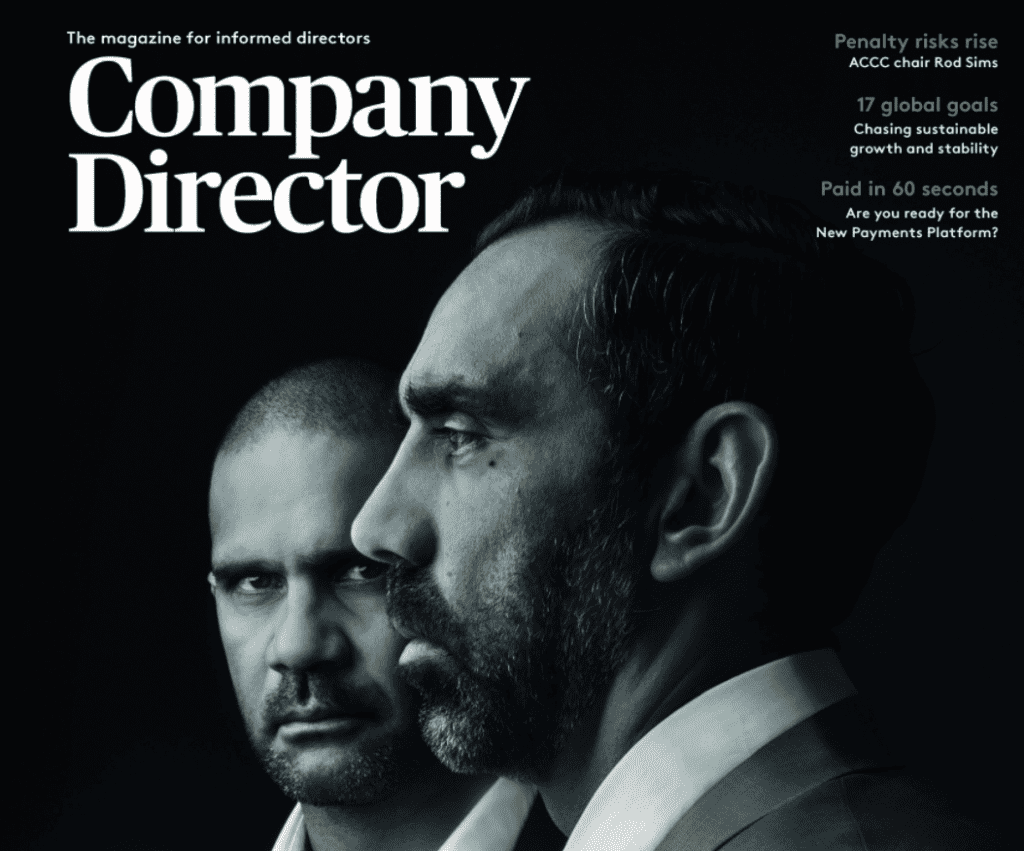In late September our team at Company Director magazine was surprised to get a LinkedIn shout out from Dan Bourchier GAICD, ABC journalist Radio and TV presenter and chair of First Nations contemporary dance company BlakDance about the ongoing coverage of First Nations directors in the member magazine of the Australian Institute of Company Directors.
The role of boards and non-executive directors in leadership and in driving change is often under-appreciated. Yet boards are the pivot point of organisational change. Their discussions and decisions, their key role of hiring and firing the CEO, holding management to account, and overseeing risk, strategy and compliance shapes the future of their organisations.
The AICD has more than 46,000 members from across the business, not for profit and government and social enterprise spectrum. Its vision is about strengthening society through world-class governance and to build the capability of a community of leaders for the benefit of society.
Good governance gets things done, holds itself accountable and makes good things happen. Poor governance stuffs things up and avoids accountability.
And who is sitting around the table (even virtually these days) and contributing, and whose voices and the diversity of perspectives that are included (or not included) in that organisational stewardship, is everything.
Since the relaunch of Company Director in October 2017, we’ve sought to profile First Nations directors, partly to cover the important work that is being done, day to day in building a more vibrant, inclusive nation. But it is mostly because we want to reflect the reality of what’s changing in Australia.
We’ve covered a range of founders, non-executive directors, CEOs and chairs from across Australia, such as the work of Indigital, MessageStick, Goanna Education, the First Nations Foundation, Supply Nation and the Indigenous Governance Awards.
One of the undersung success stories is of Australia’s largest Indigenous owned corporation, Arnhem Land Progress Aboriginal Corporation (ALPA). ALPA, led by CEO Alastair King OAM and a board of 11, operates across 20 language groups in Arnhem Land, the NT and North Queensland.
ALPA runs retail stores, mechanical workshops, building and construction businesses, employment services, school attendance programs, accommodation lodges, training and labour hire and the striking Manapan furniture design business. You might not know much about ALPA but it employs about 1000 people and of these, more than 80 per cent are First Nations Australians.
Our July 2018 cover feature on the boardroom journey of GO Foundation founders, former Sydney Swans stars Adam Goodes and Michael O’Loughlin won best cover in the Mumbrella Publish awards that year.
The story of how the pair, with help from their good mate, James Gallichan, came to understand the importance of the board to the enduring success of GO, which provides education scholarships for Indigenous students.
Over the time, some words have stuck with me.
First Nations Foundation chair Ian Hamm told us that Reconciliation Action Plans are a good start, but asked how many Indigenous Australians are active in your business?
“Reconciliation plans are a good start, but it’s not just about giving your meeting rooms Aboriginal names. How many blackfellas are in your boardrooms? Not as people serving your team but sitting at the table as board members.
“Deciding to have women on your board doesn’t make you diverse if they went to similar private schools to the men. You need broader diversity to give you a much better understanding of the social contract you’re part of. And if there is one group in Australia who understands the necessity of the group above self, it’s Aboriginal people. We bring that way of viewing things as a whole of community that, quite frankly, has been lacking in government and business for a very, very long time.”
Another was a speech by Madison Howarth, a Gringai woman of the Wonnarua nation, at a GO Foundation fund raiser. The then second-year university student had started a job in Redfern, NSW and described how her great-grandmother lived there as a 12-year-old before being taken from her home, along with her younger siblings.
“Every day, I walk through Redfern with the privilege of choosing my own path as a woman at university, on the way to the job I chose for the career I chose,” Howarth said. “However, there are so many more Indigenous women my age with the same motivation, same hunger and same passion, but without the opportunities I’ve had — and they deserve this opportunity as much as I do. For reasons beyond their control, they’re not standing up here. They’re not in this room. They’re not in class with me at uni. They won’t work alongside me. They won’t run your companies. And they won’t sit in your boardrooms. That’s the reality. Unless we make a change — and I really think we can.”
We all have the power to make that change.
Narelle Hooper is the Editor in Chief of Company Director magazine, and a non-executive director at The Ethics Centre. Narelle was named as ‘Editor of the Year – Business’ in the Mumbrella Publish Awards 2021.




